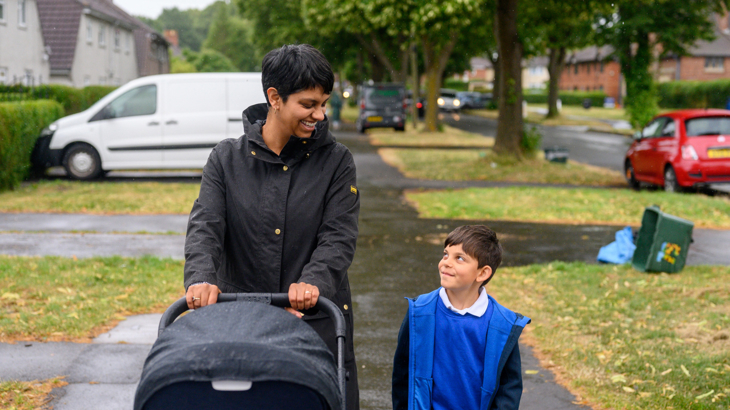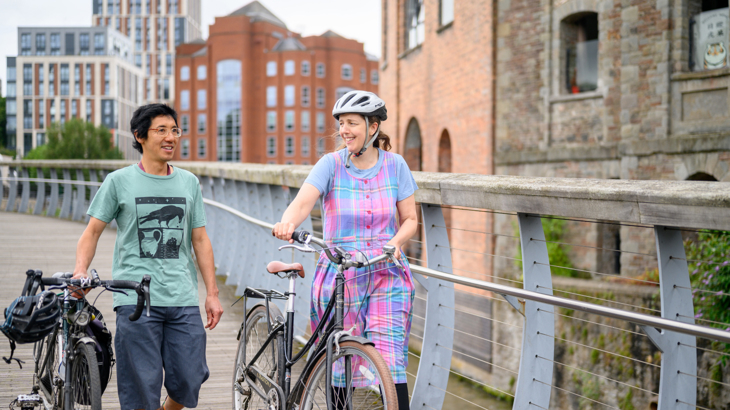Our Walking and Cycling Index 2023, the largest independent survey of active travel in the UK, has revealed that a majority (56%) of people want to see a shift in investment in road building schemes to funding options for walking, wheeling, cycling and public transport. This election year, we're calling on all political parties to recognise this evidence as the view of the public, and to prioritise active travel and public transport.

Credit: Jon Bewley
More funding wanted for walking, wheeling and cycling
Our latest Walking and Cycling Index has found that a majority (56%) of people want to shift investment in road building schemes to funding options for walking, wheeling, cycling and public transport.
Our Walking and Cycling Index 2023, the largest independent survey of active travel in the UK, also revealed greater public demand for active travel over driving, with 50% wanting to walk more and 43% wanting to cycle more.
A third of people want to make greater use of public transport.
Comparatively, just 15% want to drive more. 24% want to drive less.
This election year, we're calling on all political parties to recognise this evidence as the view of the public, and to prioritise active travel and public transport.
This will also demonstrate that the next UK government is serious about achieving its Net Zero targets, including the current Government’s own ambition for 50% of urban journeys to be walked or cycled in the next six years.
The evidence is clear
Xavier Brice, Chief Executive of Sustrans, said:
"The evidence shows that people want to have the choice to walk, cycle, and use public transport.
"Moving forwards isn’t about forcing people out of their cars.
"It is about making it easy for people to travel how they would actually prefer to, which also improves public health, the economy and our environment."

Credit: Jon Bewley
The wider benefits of active travel
Our data shows that, yearly, active travel benefits the 18 Index city economies by £6.1 billion.
And walking and cycling prevents over 21,000 serious long-term health conditions in those same cities.
In addition, journeys walked, wheeled or cycled in 2023 prevented 420,000 tonnes of greenhouse gas emissions entering the atmosphere.
A way to go to make active travel work for everyone
Xavier Brice continued:
"The UK is spending record sums on transport but the message from the public is clear.
"They want a real choice. They don’t want to be locked into driving a car because there are no other options.
"We’ve seen real improvement in the cities we’ve surveyed over the last 10 years, but there is a long way to go to make active travel work for everyone.
"Now the opportunity is for government at all levels to listen to what people want and shift future investment to options that benefit us all."
What the public wants to see
Our Index highlights the public support for initiatives focused on making it easier for people to get around their neighbourhoods:
- 65% support banning vehicles parking on the pavement with only 16% opposing
- 58% support more cycle paths protected from traffic even if this removes space for cars
- 50% support the installation of School Streets – closing streets outside schools to cars during drop-off and pick-up times. 24% disagree.

Dennis, who's from Manchester, spoke to Sustrans as part of the Walking and Cycling Index 2023. Credit: Chris Foster
Unsafe pavements impact the way people get around
Dennis, who lives in Manchester, explained her struggle to travel actively:
“When the children were small I got forced onto the road while they were on the path as there was no space for the wheelchair.
"I couldn’t see them behind the parked cars. It was very upsetting.
“Unsafe pavements isolate people in their homes. When I was a manual wheelchair user I couldn’t go anywhere on the pavement.
"We need to design our neighbourhoods to suit people rather than cars.
"We should get rid of cars on pavements.”
Find out more about our Walking and Cycling Index 2023 and download the UK report.
Find out how wheeling has helped Joanne discover a new community in her area.
Note to reader
We recognise that some people who use wheeled mobility aids, for example a wheelchair or a mobility scooter, may not identify with the term walking and may prefer to use the term wheeling.
We use the terms walking and wheeling together to ensure we are as inclusive as possible.





